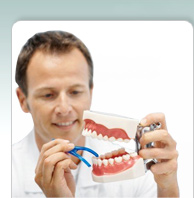 |
 |
|
|
Fluoride is one of the most effective agents for preventing tooth decay. Fluoride is safe and necessary, but only at appropriate levels. Fluoride works two ways: systemically, meaning it strengthens teeth internally, under the gums in the jawbone. Externally, fluoride strengthens enamel, the hard outer coating on teeth. |
| |
Systemic Sources of fluoride: |
| |
Drinking Water |
| Vegetables, Fruits. |
Fluoride Tablets |
| |
|
| External (local) application: |
| |
| > Toothpaste |
| > Mouthrinse |
| > Office application by the dentist in the form of fluoride gels and varnishes. |
| |
| |
|
| |
| |
Fluoride also helps repair early damage to teeth. When a weak spot on your tooth is detected, fluoride treatments may be recommended to reverse the decay process. If the weak spot is left unchecked, a cavity may form, requiring a filing. If decay is allowed to spread, it may penetrate the root and enter the pulp (nerve) chamber, causing an abscess and requiring root canal treatment. |
| |
| |
| Back |
|
|
|
| Site Map |
|
Site Designed & Maintained by Epigram Digital |
|



